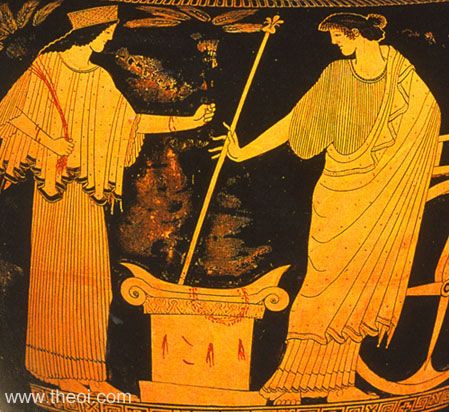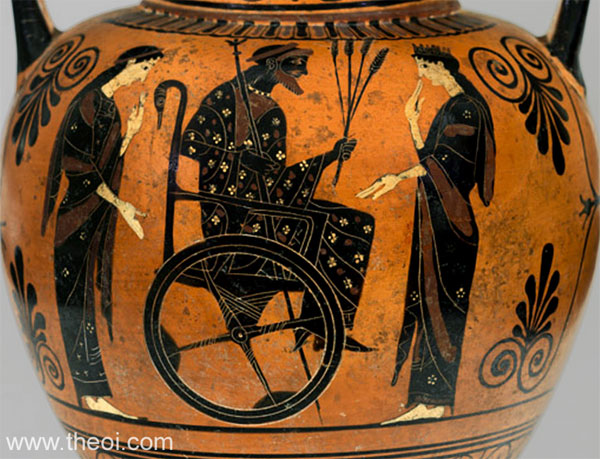DEMETER FAVOUR
Greek Name
Δημητηρ
Transliteration
Dêmêtêr
Latin Spelling
Demeter
Translation
Ceres

DEMETER was the Olympian goddess of agriculture, grain and bread.
This page describes benefactions bestowed by the goddess on men in myth. The most famous of these tales include the nursing of the infant Demophoon and the quest of the agrarian hero Triptolemos.
The story of Triptolemos is detailed on a seperate page (see the Demeter pages index).
(1) FAVOUR
KELEOS (Celeus) A king of Eleusis in Attica (southern Greece) who received the disguised goddess Demeter into his home. As a reward for his hospitality she nursed the king's infant son Demophoon, bestowing her divine blessings upon him. The goddess would have even made the boy immortal, had she not been interrupted whilst performing the ritual. She later bestowed on Keleos the gift of agriculture.
PHILOMELOS (Philomelus) A son of the goddess Demeter who lived in the region of Parion on the island of Krete (Greek Aegean). As a reward for his invention of the wagon or the plough, the goddess placed him amongst the stars as the constellation Bootes.
PHYTALOS (Phytalus) A man of Eleusis in Attica (southern Greece) who received the goddess Demeter into his home during her wanderings. As a reward for his hospitality she gave him the first fig tree.
PLEMNAIOS (Plemnaeus) A king of Sikyon (southern Greece) whose children all died at birth. Demeter took pity on the pious king and entering his home in the guise of an old woman, nursed his son Orthopolis, ensuring the boy's survival and bestowing her blessings upon him.
SEIRENES (Sirens) Aitolian nymph handmaidens of the goddess Persephone who were transformed into bird-like monsters by Demeter to assist them in the search for their abducted mistress. According to some the transformation was a curse.
TRIPTOLEMOS (Triptolemus) A prince of Eleusis (southern Greece) who so impressed the goddess Demeter with his piety that she made him her prophet and the teacher of mankind in the practise of agriculture. Some say the goddess also placed him amongst the stars with Iasion as the constellation Gemini.
TRISAULES & DAMITHALES Two Arkadian men who welcomed Demeter into their home. She bestowed on them all sorts of pulse as a reward for their hospitality.
TROPHONIOS (Trophonius) A prince of Orkhomenos (central Greece) who was nursed by Demeter, and raised together with her daughter Persephone in Boiotia. His divine-upbringing presumably helped him to achieve the rank of prophetic Chthonian Daimon (Spirit) after death.
CLASSICAL LITERATURE QUOTES
DEMETER FAVOUR : TROPHONIUS
LOCALE : Lebadeia, Boiotia (Central Greece)
Trophonios was a mortal son of Apollon who became a prophetic Daimon (or Divine Spirit) after death. The priests of the oracle claimed he was raised by Demeter along with her daughter Persephone on the site of his oracular shrine.
Pausanias, Description of Greece 9. 39. 2-5 (trans. Jones) (Greek travelogue C2nd
A.D.) :
"The grove of Trophonios [stands] by the river Herkyna. They say that here Herkyna, played with Kore
[Persephone], the daughter of Demeter . . . there is also a sanctuary of Demeter surnamed Europe . . . He who
descends [into the oracle of Trophonios] sacrifices to Trophonios himself and to the children of Trophonios, to
Apollon also and . . . to Demeter whom they surname Europa and say was the nurse of Trophonios."
For MORE information on this oracular daimon see TROPHONIOS
DEMETER FAVOUR : TRISAULES & DAMITHALES
LOCALE : Pheneos, Arkadia (Southern Greece)
Pausanias, Description of Greece 8. 15. 3-4 (trans. Jones) (Greek travelogue C2nd
A.D.) :
"The Pheneatians have a story that even before Naos arrived the wanderings of Demeter brought her to their
city also. To those Pheneatians who received her with hospitality into their homes the goddess gave all sorts of
pulse save the bean only.
There is a sacred story to explain why the bean in their eyes is an impure kind of pulse. Those who, the
Pheneatians say, gave the goddess a welcome, Trisaules and Damithales, had a temple of Demeter Thesmie
(Law-goddess) built under Mount Kyllene, and they established for her rites also, which they celebrate even to
this day."
DEMETER FAVOUR : PHYTALUS
LOCALE : Eleusis, Attika (Southern Greece)
Pausanias, Description of Greece 1. 37. 2 (trans. Jones) (Greek travelogue C2nd A.D.)
:
"As you go to Eleusis from Athens along what the Athenians call the Sacred Way you see [before crossing the
River Kephisos] . . . a sanctuary of Demeter and her daughter [Kore] . . . There is a legend that in this place
Phytalos welcomed Demeter in his home, for which act the goddess gave him the fig tree. This story is borne out
by the inscription on the grave of Phytalos :--‘Hero and king, Phytalus here welcome gave to Demeter,
august goddess, when first she created fruit of the harvest; sacred fig is the name which mortal men have
assigned it. Whence Phytalos and his race have gotten honours immortal.’"
DEMETER FAVOUR : CELEUS & DEMOPHOON

LOCALE : Eleusis, Attika (Southern Greece)
Homeric Hymn 2 to Demeter 212 ff (trans. Evelyn-White) (Greek epic C7th or 6th B.C.)
:
"[Demeter arrives at Eleusis during her Wanderings in the guise of an old woman, and is introduced to King
Keleos and Queen Metaneira :]
And of them all, well-girded Metaneira first began to speak : ‘Hail, lady! For I think you are not meanly
but nobly born; truly dignity and grace are conspicuous upon your eyes as in the eyes of kings that deal
justice. Yet we mortals bear perforce what the gods send us, though we be grieved; for a yoke is set upon our
necks. But now, since you are come here, you shall have what I can bestow: and nurse me this child whom the gods
gave me in my old age and beyond my hope, a son much prayed for. If you should bring him up until he reach the
full measure of youth, any one of womankind that sees you will straightway envy you, so great reward would I
give for his upbringing.’
Then Eustephanos (beautiful-crowned) Demeter answered her : ‘And to you, also, lady, all hail, and may the
gods give you good! Gladly will I take the boy to my breast, as you bid me, and will nurse him. Never, I ween,
through any heedlessness of his nurse shall witchcraft (epelysia) hurt him nor yet the Undercutter [teething in
infants]: for I know a charm far stronger than the Woodcutter, and I know an excellent safeguard against woeful
witchcraft.’
When she had so spoken, she took the child in her fragrant bosom with her divine hands: and his mother was glad
in her heart. So the goddess nursed in the palace Demophoon, wise Keleos' goodly son whom well-girded Metaneira
bare. And the child grew like some immortal being, not fed with food nor nourished at the breast: for by day
rich-crowned (kallistephanos) Demeter would anoint him with ambrosia as if he were the offspring of a
god and breathe sweetly upon him as she held him in her bosom. But at night she would hide him like a brand in
the heard of the fire, unknown to his dear parents. And it wrought great wonder in these that he grew beyond his
age; for he was like the gods face to face. And she would have made him deathless and unageing, had not
well-girded Metaneira in her heedlessness kept watch by night from her sweet-smelling chamber and spied. But she
wailed and smote her two hips, because she feared for her son and was greatly distraught in her heart; so she
lamented and uttered winged words : ‘Demophoon, my son, the strange woman buries you deep in fire and
works grief and bitter sorrow for me.’
Thus she spoke, mourning. And the bright goddess, lovely-crowned (kallistephanos) Demeter, heard her,
and was wroth with her. So with her divine hands she snatched from the fire the dear son whom Metaneira had born
unhoped-for in the palace, and cast him from her to the ground; for she was terribly angry in her heart.
Forthwith she said to well-girded Metaneira : ‘Witless are you mortals and dull to foresee your lot,
whether of good or evil, that comes upon you. For now in your heedlessness you have wrought folly past healing;
for--be witness the oath of the gods, the relentless water of Styx--I would have made your dear son deathless
and unaging all his days and would have bestowed on him everlasting honour, but now he can in no way escape
death and the fates. Yet shall unfailing honour always rest upon him, because he lay upon my knees and slept in
my arms. But, as the years move round and when he is in his prime, the sons of the Eleusinians shall ever wage
war and dread strife with one another continually.’ . . .
And the child [Demophoon], he grew up like an immortal being."
DEMETER FAVOUR : TRIPTOLEMUS & MANKIND
LOCALE : Eleusis, Attika (Southern Greece)
For this MYTH see TRIPTOLEMOS
DEMETER FAVOUR : PLEMNAEUS & ORTHOPOLIS
LOCALE : Korinthos, Korinthia (Southern Greece)
Pausanias, Description of Greece 2. 5. 8 (trans. Jones) (Greek travelogue C2nd A.D.)
:
"What is reported of Plemnaios [mythical king of Korinthos and a grandson of Poseidon], the son of Peratos,
seemed to me very wonderful. All the children borne to him by his wife died the very first time they wailed. At
last Demeter took pity on Plemnaios, came to Aigialea [Sikyonia] in the guise of a strange woman, and reared for
Plemnaios his son Orthopolis."
Pausanias, Description of Greece 2. 11. 2 :
"On the way down to the plain [in the city of Korinthos] is a sanctuary of Demeter, said to have been
founded by Plemnaeis as a thank-offering to the goddess for the rearing of his son."
DEMETER FAVOUR : PHILOMELUS
LOCALE : Parion, Krete (Greek Aegean)
Pseudo-Hyginus, Astronomica 2. 4 (trans. Grant) (Roman mythographer C2nd A.D.)
:
"[Constellation Bootes:] Hermippus [Greek poet C5th B.C.], who wrote about the stars, says that Ceres
[Demeter] lay with Iasion, son of Thuscus. Many agree with Homer that for this he was struck with a thunderbolt.
From them, as Petellides, Cretan writer of histories, shows, two sons were born, Philomelus and Plutus, who were
never on good terms, for Plutus, who was richer, gave nothing of his wealth to his brother. Philomelus, however,
compelled by necessity, bought two oxen with what he had, and became the inventor of the wagon [or the plow].
So, by plowing and cultivating the fields, he supported himself. His mother, admiring his invention, represented
him plowing among the stars, and called him Boötes. From him they say Parias was born, who called the
people Parians and the town Parion from his own name."
SOURCES
GREEK
- The Homeric Hymns - Greek Epic C8th - 4th B.C.
- Pausanias, Description of Greece - Greek Travelogue C2nd A.D.
ROMAN
- Hyginus, Astronomica - Latin Mythography C2nd A.D.
BIBLIOGRAPHY
A complete bibliography of the translations quoted on this page.